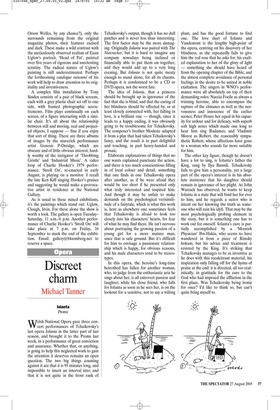Discreet charm
Michael Tanner
Iolanta Proms Welsh National Opera gave three concert performances of Tchaikovsky’s last opera Iolanta in the latter part of last season, and brought it to the Proms last week, in a performance of great conviction and assurance. Whether that, or anything, is going to help this neglected work to gain the attention it deserves remains an open question. The two big things counting against it are that it is 95 minutes long, and impossible to insert an interval into; and that it is not quite in the front rank of Tchaikovsky’s output, though it has no dull patches and is never less than interesting. The first factor may be the more damaging. Originally Iolanta was paired with The Nutcracker, but it is hard to imagine any company nowadays being inclined or financially able to put them on together, and they would add up to a very long evening. But Iolanta is not quite meaty enough to stand alone, for all its charms. Perhaps it is condemned to be a CD or DVD opera, not the worst fate.
The idea of Iolanta, that a princess should be brought up in ignorance of the fact that she is blind, and that the curing of her blindness should be effected by, or at least closely connected with, her falling in love, is a brilliant one — though, since it leads to a happy ending, it was obviously going to be troublesome for Tchaikovsky. The composer’s brother Modeste adapted it from a play that had taken Tchaikovsky’s fancy, and the result is in part delightful and touching, in part heavy-handed and prosaic.
Elaborate explanations of things that no one wants explained punctuate the action, and there is too much conscientious filling in of local colour and detail, something that one finds in one Tchaikovsky opera after another, as if he were afraid they would be too short if he presented only what truly interested and inspired him. And though it may be unfair to make demands on the psychological verisimilitude of a fairytale, which is what this work is, here as elsewhere one sometimes feels that Tchaikovsky is afraid to look too closely into his characters’ hearts, for fear of what he may find there. He isn’t nervous about portraying the growing passion of a young girl for a more mature man, since that is safe ground. But it’s difficult for him to envisage a passionate relationship which is happy, for obvious reasons, and his male characters tend to be stereotypes.
In this opera, the heroine’s long-time betrothed has fallen for another woman, who, to judge from the enthusiastic aria he sings about her, is all extrovert passion and laughter; while his close friend, who falls for Iolanta as soon as he sees her, is on the lookout for a sensitive, not to say a wilting plant, and has the good fortune to find one. The love duet of Iolanta and Vaudemont is the lengthy high-point of the opera, centring on his discovery of her blindness, as she repeatedly fails to give him the red rose that he asks for; his exalted explanation to her of the glory of light — something she should have heard of from the opening chapter of the Bible; and the almost complete avoidance of personal feelings in the desire to be united in noble exaltation. The singers in WNO’s performance were all absolutely on top of their demanding roles: Nuccia Focile as always a winning heroine, able to encompass the rapture of the climaxes as well as the nervousness and innocence of the earlier scenes; Peter Hoare her equal in his capacity for ardour and for delicacy, with superb soft high notes which made one long to hear him sing Radames; and Vladimir Moroz as Robert, the reasonably sympathetic Robert, whose affections have gone to a woman who sounds far more suitable for him.
The other key figure, though he doesn’t have a lot to sing, is Iolanta’s father the King, sung by Ilya Bannik. Tchaikovsky fails to give him a personality, yet a large part of the opera’s interest is in his absolute insistence that his daughter should remain in ignorance of her plight. As John Warrack has observed, he wants to keep Iolanta in a state that will bind her for ever to him, and he regards a suitor who is intent on her knowing the truth as someone who will ruin his idyll. That may be the most psychologically probing element in the story, but it is something one has to work out for oneself. Iolanta’s cure is partially accomplished by a ‘Moorish Physician’ Ibn-Hakia, who seems to have wandered in from a piece of Rimsky hokum, but his advice and treatment is resisted by the King. It’s striking that Tchaikovsky manages to be as inventive as he does with this recalcitrant material, his inspiration only falling off for the hymn of praise at the end: it is directed, all too realistically, in gratitude for the cure to the God who had imposed the affliction in the first place. Was Tchaikovsky being ironic for once? I’d like to think so, but can’t quite bring myself to.











































 Previous page
Previous page